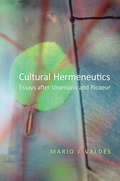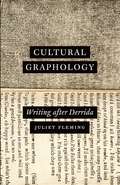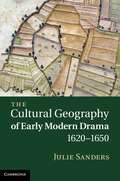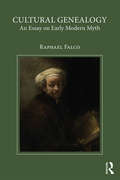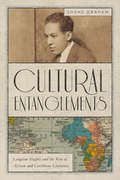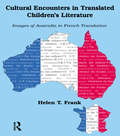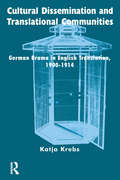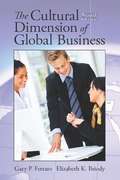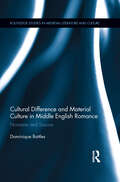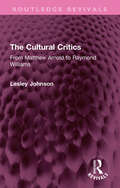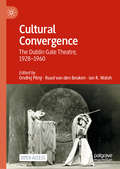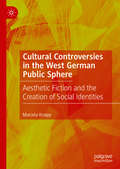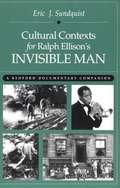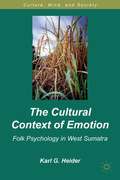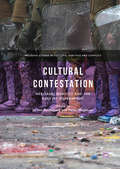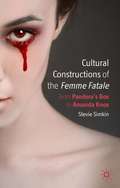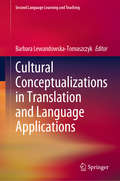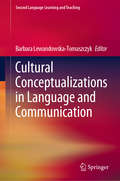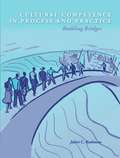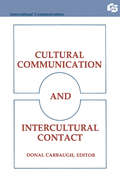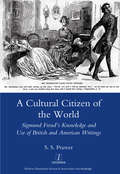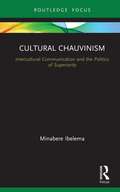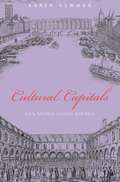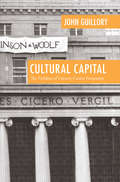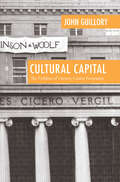- Table View
- List View
Cultural Hermeneutics: Essays after Unamuno and Ricoeur
by Mario ValdesIn Cultural Hermeneutics, Mario J. Valdés offers a synthesis of the hermeneutic philosophies of Miguel de Unamuno and Paul Ricoeur, a dialectical method that has formed the basis for many of Valdés' own studies in comparative literature. As Valdés explains in these insightful essays, what Unamuno and Ricoeur shared in their hermeneutic studies was a theory of interpretation in which the meaning of a work of art comes into existence through the dialectical relationship between its creator and its readers, listeners, or viewers. Contextualizing this hermeneutic concept as it appears in the works of both philosophers, Cultural Hermeneutics presents the basis for a profound understanding of the arts.
Cultural Graphology: Writing after Derrida
by Juliet Fleming"Cultural Graphology" could be the name of a new human science: this was Derrida's speculation when, in the late 1960s, he imagined a discipline that combined psychoanalysis, deconstruction, and a commitment to the topic of writing. He never undertook the project himself but did leave two brief sketches of how he thought cultural graphology might proceed. In this book, Juliet Fleming picks up where Derrida left off. Using both his early and later thought, and the psychoanalytic texts to which it is addressed, to examine the print culture of early modern England, she drastically unsettles some key assumptions of book history. Fleming shows that the single most important lesson to survive from Derrida's early work is that we do not know what writing is. Channeling Derrida's thought into places it has not been seen before, she examines printed errors, spaces, and ornaments (topics that have hitherto been marginal to our accounts of print culture) and excavates the long-forgotten reading practice of cutting printed books. Proposing radical deformations to the meanings of fundamental and apparently simple terms such as "error," "letter," "surface," and "cut," Fleming opens up exciting new pathways into our understanding of writing all told.
The Cultural Geography of Early Modern Drama, 1620–1650
by Julie SandersLiterary geographies is an exciting new area of interdisciplinary research. Innovative and engaging, this book applies theories of landscape, space and place from the discipline of cultural geography within an early modern historical context. Different kinds of drama and performance are analysed: from commercial drama by key playwrights to household masques and entertainment performed by families and in semi-official contexts. Sanders provides a fresh look at works from the careers of Ben Jonson, John Milton and Richard Brome, paying attention to geographical spaces and habitats like forests, coastlines and arctic landscapes of ice and snow, as well as the more familiar locales of early modern country estates and city streets and spaces. Overall, the book encourages readers to think about geography as kinetic, embodied and physical, not least in its literary configurations, presenting a key contribution to early modern scholarship.
Cultural Genealogy: An Essay on Early Modern Myth
by Raphael FalcoCultural Genealogy explores the popularization in the Renaissance of the still pervasive myth that later cultures are the hereditary descendants of ancient or older cultures. The core of this myth is the widespread belief that a numinous charismatic power can be passed down unchanged, and in concrete forms, from earlier eras. Raphael Falco shows that such a process of descent is an impossible illusion in a knowledge-based culture. Anachronistic adoption of past values can only occur when these values are adapted and assimilated to the target culture. Without such transcultural adaptation, ancient values would appear as alien artifacts rather than as eternal truths. Scholars have long acknowledged the Renaissance borrowings from classical antiquity, but most studies of translatio studii or translatio imperii tacitly accept the early modern myth that there was a genuine translation of Greek and Roman cultural values from the ancient world to the "modern." But as Falco demonstrates, this is patently not the case. The mastering of ancient languages and the rediscovery of lost texts has masked the fact that surprisingly little of ancient religious, ethical, or political ideology was retained — so little that it is crucial to ask why these myths of transcultural descent have not been recognized and interrogated. Through examples ranging from Petrarch to Columbus, Maffeo Vegio to the Habsburgs, Falco shows how the new techne of systematic genealogy facilitated the process of "remythicizing" the ancient authorities, utterly transforming Greek and Roman values and reforging them into the mold of contemporary needs. Chiefly a study of intellectual culture, Cultural Genealogy has ramifications reaching into all levels of society, both early modern and later.
Cultural Entanglements: Langston Hughes and the Rise of African and Caribbean Literature (New World Studies)
by Shane GrahamIn addition to being a poet, fiction writer, playwright, and essayist, Langston Hughes was also a globe-trotting cosmopolitan, travel writer, translator, avid international networker, and—perhaps above all—pan-Africanist. In Cultural Entanglements, Shane Graham examines Hughes’s associations with a number of black writers from the Caribbean and Africa, exploring the implications of recognizing these multiple facets of the African American literary icon and of taking a truly transnational approach to his life, work, and influence. Graham isolates and maps Hughes’s cluster of black Atlantic relations and interprets their significance. Moving chronologically through Hughes’s career from the 1920s to the 1960s, he spotlights Jamaican poet and novelist Claude McKay, Haitian novelist and poet Jacques Roumain, French Negritude author Aimé Césaire of Martinique, South African writers Es’kia Mphahlele and Peter Abrahams, and Caribbean American novelist Paule Marshall. Taken collectively, these writers’ intellectual relationships with Hughes and with one another reveal a complex conversation—and sometimes a heated debate—happening globally throughout the twentieth century over what Africa signified and what it meant to be black in the modern world. Graham makes a truly original contribution not only to the study of Langston Hughes and African and Caribbean literatures but also to contemporary debates about cosmopolitanism, the black Atlantic, and transnational cultures.
Cultural Encounters in Translated Children's Literature
by Helen FrankCultural Encounters in Translated Children's Literature offers a detailed and innovative model of analysis for examining the complexities of translating children's literature and sheds light on the interpretive choices at work in moving texts from one culture to another. The core of the study addresses the issue of how images of a nation, locale or country are constructed in translated children's literature, with the translation of Australian children's fiction into French serving as a case study. Issues examined include the selection of books for translation, the relationship between children's books and the national and international publishing industry, the packaging of translations and the importance of titles, blurbs and covers, the linguistic and stylistic features specific to translating for children, intertextual references, the function of the translation in the target culture, didactic and pedagogical aims, euphemistic language and explicitation, and literariness in translated texts. The findings of the case study suggest that the most common constructs of Australia in French translations reveal a preponderance of traditional Eurocentric signifiers that identify Australia with the outback, the antipodes, the exotic, the wild, the unknown, the void, the end of the world, the young and innocent nation, and the Far West. Contemporary signifiers that construct Australia as urban, multicultural, Aboriginal, worldly and inharmonious are seriously under-represented. The study also shows that French translations are conventional, conservative and didactic, showing preference for an exotic rather than local specificity, with systematic manipulation of Australian referents betraying a perception of Australia as antipodean rural exoticism. The significance of the study lies in underscoring the manner in which a given culture is constructed in another cultural milieu, especially through translated children's literature.
Cultural Dissemination and Translational Communities: German Drama in English Translation 1900-1914
by Katja KrebsThe early twentieth century is widely regarded as a crucial period in British theatre history: it witnessed radical reform and change with regard to textual, conceptual and institutional practices and functions. Theatre practitioners and cultural innovators such as translators Harley Granville Barker, William Archer and Jacob Thomas Grein, amongst others, laid the foundations during this period for - what is now regarded to be - modern British theatre. In this groundbreaking work, Katja Krebs offers one of the first extended attempts to integrate translation history with theatre history by analyzing the relationship between translational practice and the development of domestic dramatic tradition. She examines the relationship between the multiple roles inhabited by these cultural and theatrical reformers - directors, playwrights, critics, actors and translators - and their positioning in a wider social and cultural context. Here, she takes into consideration the translators as members of an artistic network or community, the ideological and personal factors underlying translational choices, the contemporaneous evaluative framework within which this translational activity for the stage occurred, as well as the imprints of social and cultural traces within specific translated texts. Krebs employs the examples from this period in order to raise a series of wider issues on translating dramatic texts which are important to a variety of periods and cultures. Cultural Dissemination and Translational Communities demonstrates that an analysis of stage-translational practices allows for an understanding of theatre history that avoids being narrowly national and instead embraces an appreciation of cultural hybridity. The importance of translational activity in the construction of a domestic dramatic tradition is demonstrated within a framework of interdisciplinarity that enhances our understanding of theatrical, translational as well as cultural and social systems at the international level.
The Cultural Dimension of Global Business 7th Edition
by Gary P. Ferraro Elizabeth K. BriodyThe Cultural Dimension of Global Business provides a foundation for understanding the impact of culture on global business and global business on culture.
Cultural Difference and Material Culture in Middle English Romance: Normans and Saxons
by Dominique BattlesThis book explores how the cultural distinctions and conflicts between Anglo-Saxons and Normans originating with the Norman Conquest of 1066 prevailed well into the fourteenth century and are manifest in a significant number of Middle English romances including King Horn, Havelok the Dane, Sir Orfeo, Sir Gawain and the Green Knight, and others. Specifically, the study looks at how the material culture of these poems (architecture, battle tactic, landscapes) systematically and persistently distinguishes between Norman and Anglo-Saxon cultural identity. Additionally, it examines the influence of the English Outlaw Tradition, itself grounded in Anglo-Saxon resistance to the Norman Conquest, as expressed in specific recurring scenes (disguise and infiltration, forest exile) found in many Middle English romances. In the broadest sense, a significant number of Middle English romances, including some of the most well-read and often-taught, set up a dichotomy of two ruling houses headed by a powerful lord, who compete for power and influence. This book examines the cultural heritage behind each of these pairings to show how poets repeatedly contrast essentially Norman and Anglo-Saxon values and ruling styles.
The Cultural Critics: From Matthew Arnold to Raymond Williams (Routledge Revivals)
by Lesley JohnsonOriginally published in 1979, the central focus of this study is the concept of culture as employed by English literary intellectuals over the preceding 100 years, a period characterized by a constant process of re-definition and change. The tradition of criticism in which these intellectuals wrote represented the artistic imagination as a moral force in society and a fundamental mechanism for social change. The author traces this tradition through the writings of various English intellectuals, using the three main figures of Matthew Arnold, F. R. Leavis and Raymond Williams to elucidate the concept. She shows, through the writings of their contemporaries, how the concept was employed and modified, and her analysis ranges from J. S. Mill, John Ruskin and William Morris, through George Bernard Shaw, D. H. Lawrence, T. S. Eliot and R. H. Tawney to Richard Hoggard, Richard Wollheim and R. S. Peters. By discussing the questions of the role of art in society and examining their treatment by different groups of intellectuals, the author has supplied a basis for a forceful critique of the quality of life in modern industrial society. This book will be of interest to students of literature, cultural history and the sociology of culture.
Cultural Convergence: The Dublin Gate Theatre, 1928–1960
by Ondřej Pilný Ian R. Walsh Ruud van den BeukenBased on extensive archival research, this open access book examines the poetics and politics of the Dublin Gate Theatre (est. 1928) over the first three decades of its existence, discussing some of its remarkable productions in the comparative contexts of avant-garde theatre, Hollywood cinema, popular culture, and the development of Irish-language theatre, respectively. The overarching objective is to consider the output of the Gate in terms of cultural convergence – the dynamics of exchange, interaction, and acculturation that reveal the workings of transnational infrastructures.
Cultural Controversies in the West German Public Sphere: Aesthetic Fiction and the Creation of Social Identities
by Marcela KnappThis book develops a theory of aesthetic fiction’s impact on social identities. Throughout five case studies, the author develops the argument that social identities are nurtured by and may even emerge through the conflict between different aesthetic expressions. As it creates affective structures, narrative fiction enables the development and formation of political and cultural identities. This work is part of a field of research that deals with the aesthetics of the everyday and the idea of social aesthetics. It argues for a central role for the arts in the creation and formation of modern society. Social identities emerge in response to aesthetic-sensual patterns of perception.Focusing on five West German public debates in the years 1950 to 1990, this work sheds light upon the transformation of social reality through the discursive adaption of art.
Cultural Contexts for Ralph Ellison's Invisible Man: A Bedford Documentary Companion
by Eric J. SundquistA unique supplement to one of the most important African American novels of this century. As Invisible Man chronicles the major moments of African American life during the first half of the twentieth century, this volume illuminates and contextualizes the novel with a collection of speeches, essays, folktales, historical analyses, photographs, and other cultural and historical documents.
The Cultural Context of Emotion
by Karl G. HeiderBased on the author's second stage of research on emotions of the matrilineal Moslem Minangkabau of West Sumatra, Indonesia, this book is a continuation of Heider's groundbreaking 1991 book, Landscapes of Emotion . This work demonstrates how situating emotion at the center of an investigation is a powerful ethnographic tool.
Cultural Contestation: Heritage, Identity And The Role Of Government (Palgrave Studies In Cultural Heritage And Conflict)
by Jeroen Rodenberg Pieter WagenaarHeritage practices often lead to social exclusion, as such practices can favor certain values over others. In some cases, exclusion from a society’s symbolic landscape can spark controversy, or rouse emotion so much so that they result in cultural contestation. Examples of this abound, but few studies explicitly analyze the role of government in these instances. In this volume, scholars from a variety of academic backgrounds examine the various and often conflicting roles governments play in these processes—and governments do play a role. They act as authors and authorizers of the symbolic landscape, from which societal groups may feel excluded. Yet, they also often attempt to bring parties together and play a mitigating role.
Cultural Constructions of the Femme Fatale
by Stevie SimkinThe figure of the beautiful but lethal woman has haunted the Western imagination from ancient myth (Pandora, Eve, Lilith) to contemporary cinema. However, there are also remarkable 'real life' cases of women on trial for murder who have been represented as femmes fatales, including Frances Howard in the court of King James I, Ruth Snyder (the inspiration for The Postman Always Rings Twice) in the 1920s and, most recently, Amanda Knox, accused of murdering a fellow student in Italy in 2007. This interdisciplinary study traces the figure of the femme fatale across a broad cultural map, considering representations in news media, drama, film, art and literature, and the relationships between them. By considering the ways each of these lethal women has been coded, decoded and re-encoded, Stevie Simkin reveals how Western culture and society has struggled to comprehend and contain female violence.
Cultural Conceptualizations in Translation and Language Applications (Second Language Learning and Teaching)
by Barbara Lewandowska-TomaszczykThe book comprises a selection of 14 papers concerning the general theme of cultural conceptualizations in communication and translation, as well as in various applications of language.Ten papers in first part Translation and Culture cover the topics of a cognitive approach to conceptualizations of Source Language – versus Target Language – texts in translation, derived from general language, media texts, and literature.The second part Applied Cultural Models comprises four papers discussing cultural conceptualizations of language in the educational context, particularly of Foreign Language Teaching, in online communication and communication in deaf communities.
Cultural Conceptualizations in Language and Communication (Second Language Learning and Teaching)
by Barbara Lewandowska-TomaszczykThe book comprises a selection of papers concerning the general theme of cultural conceptualizations in language. The focus of Part 1, which includes four papers, is on Metaphor and Culture, discussing general as well as language-specific metaphoricity.Part 2, which also includes three papers, is on Cultural Models, dealing with phenomena relating to family and home, nation and kinship, blood, and death in different cultures. Six papers in Part 3, which refers to questions of Identity and Cultural Stereotypes, both in general language and in literature, discuss identity in native and migration contexts and take up motifs of journey and migration, as well as social and cultural stereotypes and prejudice in transforming contexts. Three papers in the last Part 4 of the book, Linguistic Concepts, Meanings, and Interaction, focus on the semantic interpretation of the changes and differences which occur in their intra- as well as inter-linguistic contexts.
Cultural Competence In Process And Practice: Building Bridges
by Juliet RothmanNow more than ever, the populations social workers must be trained to work with represent the broadest spectrum of humanity - in ethnicity, culture, race, religion, worldview, gender, sexual orientation, ability, and in life experiences. This text will prepare students to work with any population they will encounter in their professional career. It's divided into 3 parts; Unit 1 covers social work processes, Unit 2 contains student case examples, and unit 3 contains student exercises.
Cultural Communication and Intercultural Contact (Routledge Communication Series)
by Donal CarbaughHow is cultural identity accomplished interactively? What happens when different cultural identities contact one another? This book presents a series of papers, from classic essays to original expositions, which respond to these questions. The view of communication offered here -- rather than ignoring culture, or making it a variable in an equation -- is based on cultural patterns and situated communication practices, unveiling the multiplicity of factors involved in particular times and places. The contributors to this unusual volume represent a wide range of fields. Their equally diverse offerings will serve to clarify cultural distinctiveness in some communication phenomena, and lay groundwork for the identification of cross-cultural generalities in others.
A Cultural Citizen of the World: Sigmund Freud's Knowledge and Use of British and American Writings
by S. S. PrawerThis book is based on the German editions of Sigmund Freud's works and letters. It presents various examples from English and American literatures that suggest several questions Freud asked of literary works in general.
Cultural Chauvinism: Intercultural Communication and the Politics of Superiority (Routledge Focus on Media and Cultural Studies)
by Minabere IbelemaThis book explores the concept of cultural chauvinism as the sense of superiority that ethnic or national groups have of themselves relative to others, particularly in the context of international relations. Minabere Ibelema shows the various ways that academics, statesmen, and especially journalists, express their cultural groups’ sense of superiority over others. The analysis pivots around the notion of “Western values” given its centrality in international relations and diplomacy. To the West, this stands for an array of largely positive political and civic values; to a significant portion of the global community, it embodies degeneracies. Ibelema argues that often the most routine expressions go under the radar, even in this age of hypersensitivity. This book throws a unique light on global relations and will be of particular interest to scholars in international relations, communication studies and journalism studies.
Cultural Capitals: Early Modern London and Paris
by Karen NewmanSocial theories of modernity focus on the nineteenth century as the period when Western Europe was transformed by urbanization. Cities became thriving metropolitan centers as a result of economic, political, and social changes wrought by the industrial revolution. In Cultural Capitals, Karen Newman demonstrates that speculation and capital, the commodity, the crowd, traffic, and the street, often thought to be historically specific to nineteenth-century urban culture, were in fact already at work in early modern London and Paris. Newman challenges the notion of a rupture between premodern and modern societies and shows how London and Paris became cultural capitals. Drawing upon poetry, plays, and prose by writers such as Shakespeare, Scudéry, Boileau, and Donne, as well as popular materials including pamphlets, ballads, and broadsides, she examines the impact of rapid urbanization on cultural production. Newman shows how changing demographics and technological development altered these two emerging urban centers in which new forms of cultural capital were produced and new modes of sociability and representation were articulated.Cultural Capitals is a fascinating work of literary and cultural history that redefines our conception of when the modern city came to be and brings early modern London and Paris alive in all their splendor, squalor, and richness.
Cultural Capital: The Problem of Literary Canon Formation
by John GuilloryJohn Guillory challenges the most fundamental premises of the canon debate by resituating the problem of canon formation in an entirely new theoretical framework. The result is a book that promises to recast not only the debate about the literary curriculum but also the controversy over "multiculturalism" and the current "crisis of the humanities. " Employing concepts drawn from Pierre Bourdieu's sociology, Guillory argues that canon formation must be understood less as a question of the representation of social groups than as a question of the distribution of "cultural capital" in the schools, which regulate access to literacy, to the practices of reading and writing.
Cultural Capital: The Problem of Literary Canon Formation
by John GuilloryJohn Guillory challenges the most fundamental premises of the canon debate by resituating the problem of canon formation in an entirely new theoretical framework. The result is a book that promises to recast not only the debate about the literary curriculum but also the controversy over "multiculturalism" and the current "crisis of the humanities." Employing concepts drawn from Pierre Bourdieu's sociology, Guillory argues that canon formation must be understood less as a question of the representation of social groups than as a question of the distribution of "cultural capital" in the schools, which regulate access to literacy, to the practices of reading and writing.
